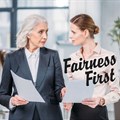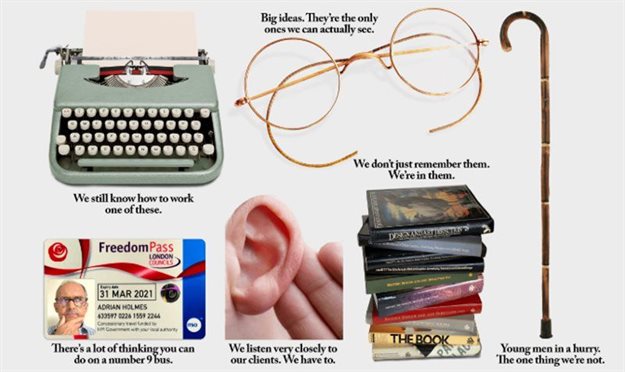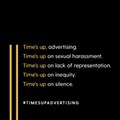#FairnessFirst: How to end office ageism with a perennial mindset

As with most forms of discrimination, age discrimination probably doesn’t register for you unless you’ve experienced it yourself. Unfortunately, it’s an all-too-common occurrence for many, especially in the creative industries.
The younger generation can’t get a job without experience, the older set with the experience are seen to be lacking the cutting-edge social and tech skills needed to flourish in business today.
That’s why new British agency ‘Ancient & Modern’ is raising interest across the globe for it’s interesting move dubbed as “challenging the ageism in advertising head-on”.
Challenging ageism in advertising, head-on
Featuring three industry heavyweights: copywriter Adrian Holmes, behavioural brand strategist Seamus O’Farrell and award-winning art director John O’Driscoll, Ancient & Modern’s homepage is reminiscent of old-school newspaper layout and speaks of the “advantages to being London’s oldest advertising agency".
Fittingly, phone numbers and email addresses are listed as primary forms of contact, not Skype names and social media details.
Their work ranges from the laugh-out-loud funny ‘ancient’ to the quirkily clever modern, such as a short film showing the steps Unilever is taking to cut down on their own plastic waste around the world. Alan Jope, Unilever’s CEO, begins:
There’s a lot of plastic pollution in the environment and the uncomfortable truth is that some of it has got our name on it, and that’s not OK.It’s an opening that just draws you in and proves this ‘old’ agency has a finger on the pulse of what’s important to today’s consumers:
Plastic has its place, but that place is not in the environment. Today, we’ve committed to halving our use of virgin plastic, and to collect and process more plastic packaging than we sell, by 2025. #Plastic #PlasticWaste https://t.co/kIJxw5L06p pic.twitter.com/GtnJdRsgOU
— Alan Jope (@alanjope) October 7, 2019
Your early studies and experiences are the building blocks for a successful career with longevity.
The age of experience: Upskill yourself to become and stay relevant
Tackling ageism or age discrimination is really coming to the fore, as a topic that’s now being addressed at global awards shows. In fact, a few years ago, The One Club for Creativity’s CEO Kevin Swanepoel shared with our correspondent Ann Nurock:Although we are struggling with gender and diversity, I think one of the biggest things that is really affecting this industry is ageism, where you have amazing creatives and people within agencies who are being aged out as they become either too expensive or as they become too senior, because people can hire a younger team or two/three people for what it costs to hire somebody who has been there a long time.
Ban Boomer/Snowflake talk, embrace a Perennial mentor mindset
But don’t be tempted to fall into the ‘OK Boomer’/’Millennial snowflake’ talk either, as Nicol Myburgh, head of the HR Business Unit at CRS Technologies, says ageism is a real problem in the South African job market.
Even if a job seeker has an impressive CV and experience that stretches back many years, they might not secure the position they apply for because of their age. Similarly, referring to Millennials at the workplace as ‘snowflakes’ can also constitute harassment or ageism if the references become regular occurrences.
That’s why Perennials have been dubbed the secret weapon every company needs.
Perennials, falling generationally somewhere between the two extremes, are defined as an evergreen generation who remain curious and relevant despite their age. This generation is energetic, switched on and most importantly, employable. Some say that they incorporate the best of the boomer traits (hardworking, value-based), and those of Millennials (curious, tech-savvy).
The #TimesUpAdvertising movement in particular has seen a rise of 'diversity and inclusion' focused roles popping in the marketing industry, placing renewed focus on a range of ages and experience levels for true business transformation, as ageism is experienced at both ends of the spectrum.
For the more experienced set, fewer opportunities come your way if you can’t prove you’ve actively kept up with the times and trends. It’s a wake-up call for most of us who did our basic studies a decade or more ago, as many of the jobs of today didn’t even exist back then.
Essentially, it’s about embracing an attitude of life-long learning and upskilling ourselves.
We also need to be aware of the fact that just because the younger generation is seen as more technologically skilled, doesn’t mean they’ve had the access to grab all the opportunities that come their way. It’s a real Catch-22, where you can’t get a job without experience, and you can’t get experience without a job.
The ideal solution here is a two-way mentorship model, where the mentor role isn’t 100% filled by the person with more years on the job.
The younger person can teach new skills, making it a symbiotic relationship.
Only in having a truly diverse workforce can we hope to truly connect with consumers, by making every effort to ensure our work reflects their reality.








































